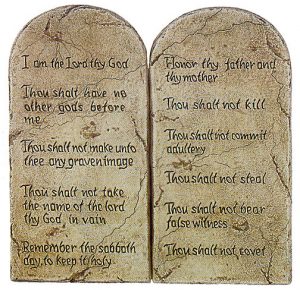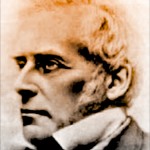 There are expressions which are used by Christians, which as well as being unscriptural, convey a meaning which is also contrary to the truth as presented in scripture. One of these is ‘moral law’.
There are expressions which are used by Christians, which as well as being unscriptural, convey a meaning which is also contrary to the truth as presented in scripture. One of these is ‘moral law’.
People speak about a ‘moral law’, but they have only a vague idea of what is meant by the expression. They say, ‘Live by the ten commandments’ or, ‘Do to others what you would have them do to you’ (Matt 7:12 NIV). They quote scripture, but in so doing put themselves and others under bondage. That is not Christianity. The Christian has been delivered from the law.
Christians under a so-called ‘moral law’ have set aside Paul’s teaching. They show a semblance of piety, but are effectively seeking to be justified by works. Even if the works were good ones, they are under a curse. (see Gal 3:10). A Christian, being of a fallen race, finds himself ruined by the law, deceived by it to his own sorrow. The law knows no mercy. He is spiritually dead.
Paul found that experimentally. Paul saw that the law condemned lust. So, because he lusted he was self-condemned. Lust was in his nature. The law claimed absolute obedience to God, but he found he did not have the power to keep it. He wanted to do what was right but couldn’t. In short, he coveted, and thus broke the law. What was ordained to life, he found to be to death (see Rom 7:10).
Christ and the Law
God gave the promise to Abraham. The law was given later. If the law could have given life, righteousness could have been by the law. But the law did not give either the motive or the power to do right. That is why in Galatians the law is treated as a schoolmaster. The law condemns sins. More than that, it condemns sin.
In Romans 7 Paul insisted that one cannot have two husbands at the same time. A Christian cannot cannot be under obligation to both Christ and the law. A Christian is ‘dead to the law by the body of Christ’ (Rom 7:4). If he (or she) is dead, he is no longer under the law. , ‘Sin shall not have dominion over you, because ye are not under the law, but under grace’ (Rom 6:14).
Somebody might say, ‘Yes; but the flesh is still there, so I need the law, not to put away sin, but that it might not have dominion.’ That is false – The Christian is to be consciously dead in Christ. If a person is dead, he is beyond the reach of law by death. The Christian has died with Christ and is resurrection: he is in newness of life – in Christ, not Adam.
I am ‘dead to the law by the body of Christ’ (Rom 7:4). The death that the law sentenced me to in my conscience has fallen on another — Christ. Otherwise I would have been left in everlasting misery. But in love Christ put Himself in my place. Now I am justified and have a right to reckon myself dead, because Christ has died and has risen again. I have received Him into my heart as life: He is really my life.
Godliness is walking with a risen Christ – that is Christian life. The measure of that walk is Christ, and nothing else.
The Divine Law
A true believer always holds difference between right and wrong, to be an immovable and fixed moral foundation. It is revealed by God in His word.
The Lord said ‘Keep my commandments’ (John 15:10) and John wrote ‘This is love, that we keep His commandments’ (1 John 5:2) . Some are afraid of the word ‘commandment’, as if it would weaken the ideas of love, grace and new creation. But keeping the commandments and obeying one we love is the proof of our love. Christ Himself said, ‘I love the Father, and as the Father hath given me commandment, so I do.’ (John 14:31). His highest act of love, in dying for us on the cross, was His highest act of obedience.
The Spirit will produce fruits against which there is no law.
- ‘But the fruit of the Spirit is love, joy, peace, longsuffering, gentleness, goodness, faith, meekness, temperance: against such there is no law’ (Gal 5:22-23.
- ‘Be ye therefore imitators of God, as beloved children, and walk in love’ (Eph 5:1-2 Darby).
- ‘Put on therefore, as [the] elect of God, holy and beloved, bowels of compassion, kindness, lowliness, meekness, longsuffering; forbearing one another, and forgiving one another, if any should have a complaint against any; even as the Christ has forgiven you, so also do ye. And to all these add love, which is the bond of perfectness’ (Col 3:12-14 Darby).
- A new commandment I give unto you, That ye love one another; as I have loved you, that ye also love one another. (John 13:34)
This is a summary of part of letter written by John Nelson Darby. It is published in Collected Writings Volume 10 (Doctrinal 3) page 1.
This summary covers the first wrong term ‘moral law’. A subsequent article, will, God willing, cover the second term ‘Christ’s righteousness’.
Sosthenes
December 2016



